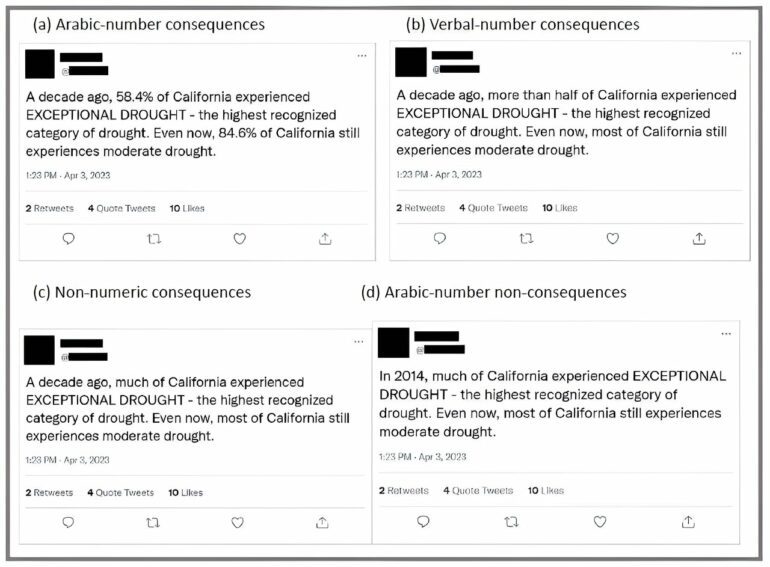The intuition to distill hard numbers like “90 percent” into words like “almost all” may help make science and statistics more accessible, but new research shows that isn’t necessarily the best way to engage people online.
Researchers from the University of Oregon, Michigan State University and Ohio State University have found that people tend to share and trust social media posts that contain numbers more than those without. The researchers particularly looked at tweets and Reddit posts related to climate change, one of the most pressing issues that requires using and communicating numeric information, said Ellen Peters, director of the UO’s Center for Science Communication Research.
“The majority of the American public at this point do believe that climate change is real and happening, but what’s missing is people engaging with it and understanding what actions can be done,” Peters said. “Social media is one of the places where the public and scientists can come together and potentially learn from each other.”
When Peters and her team analyzed tweets from approximately 1,500 climate scientists, only 23 percent of posts contained numbers. Yet those few numerical tweets were more likely to be shared than non-numerical tweets.
That suggests climate communicators may be underestimating the power of numeric information in improving knowledge on current environmental issues, said David Markowitz, a former assistant professor of social media data analytics at the UO’s School of Journalism and Communication.
“Numbers can be scary and daunting, but people don’t shy away from them,” said Markowitz, now an associate professor at Michigan State University. “Our results show that people engage with numbers, and that’s quite encouraging for journalists or scientists in the climate change arena who want to know the best ways to engage the public.”
The researchers describe their findings in a paper published July 23 in the journal PNAS Nexus.
Previous studies have shown that people trust messages from physicians and journalists more when they contain a number. In fact, Peters recently found that people were more likely to want to get vaccinated if they were shown the numerical likelihoods of the side effects. She wondered if providing data-focused communications could similarly bring engagement to the climate crisis.
Peters and her team scraped data from social media platforms X, known as Twitter at the time, and Reddit and sifted through more than 8 million tweets and 17,000 posts and comments related to climate change. They found that messages with numerical information had greater engagement, with 16.9 percent more retweets on X and 31.7 percent more upvotes on Reddit than those without.
However, the researchers were puzzled when they noticed the same tweets were liked 5.2 percent less often. They initially anticipated likes to boost in the same way as retweets and upvotes and grew curious when they observed the opposite. To uncover some of the psychology behind sharing versus liking a post, the researchers did a follow-up study.
They created four kinds of tweets that described the consequences of climate change, with posts containing either an exact number (for example, “58.4 percent”), a numeric descriptor (“more than half”), a non-numeric descriptor (“much of”) or a number that was unrelated to the science (“year of 2014”).
Study participants were assigned to read 20 tweets from one of the four categories. As anticipated, participants were more likely to reshare and trust tweets with an exact number but were less inclined to like them. In surveys, many participants thought the numeric tweets were more accurate, clear and interesting, but they also felt negatively toward them.
Peters hypothesized that the environmental doom conveyed in the tweets could be why people didn’t click “like” on them, especially since X uses a heart symbol to represent likes. Negative feelings like climate anxiety and fear, however, can be paralyzing, Peters said. She advises that messages on environmental crises include not only the hard facts but also feasible solutions that foster confidence and help people overcome climate apathy.
Climate communications shouldn’t include numbers for the sake of having them, Peters notes. Instead, numbers need to be presented thoughtfully and packaged in a way that’s easy to comprehend and relevant to the audience. For example, in explaining the number of inches of sea level rise, Peters suggested pointing out key destinations that will be impacted, like how a local restaurant may be in danger of collapse.
“Present numeric data in a more experiential kind of way so that people can feel the numbers more,” she said.
Peters believes harnessing the overlooked power of communicating with numbers can bridge long-term trust between science and the public.
“People should be allowed to see data if they want it,” she said. “And over time, maybe we will increase the public’s ability to use and be comfortable with numbers. That’s what I hope.”
More information:
Ellen Peters et al, Numeric social-media posts engage people with climate science, PNAS Nexus (2024). DOI: 10.1093/pnasnexus/pgae250
Provided by
University of Oregon
Citation:
Communicating numbers boosts trust in climate change science, research suggests (2024, July 26)



